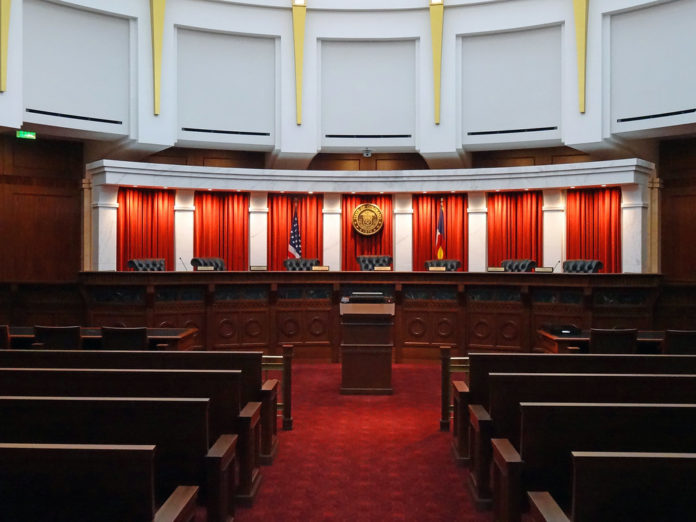

While the Sixth Amendment guarantees criminal defendants the right to an attorney, indigent defendants don’t get to choose who represents them. But once a public defender has been assigned, does a defendant have the right to have that specific attorney stay on their case?
The Colorado Supreme Court on Dec. 6 agreed to address that question in a pair of cases involving defendants whose court-appointed attorneys were swapped for new counsel shortly before trial due to scheduling conflicts.
The defendant in the first case, Robert Rainey, was originally scheduled to go to trial in January 2017 on kidnapping and domestic violence charges. But his trial was pushed back several times for reasons beyond his control, including damage to the courthouse, a lack of jurors and two motions for continuance by the prosecution.
Rainey’s trial was rescheduled for March 6, 2017 — a day before the speedy trial deadline. He requested a continuance because his court-appointed public defender, Neil DeVoogd, was going to be out of town that day. But the trial court judge denied the request, citing scheduling issues that would make it difficult to reset the trial. Rainey’s case wasn’t a high priority nor was it complicated, the judge noted, and another public defender could represent him at trial.
A jury convicted Rainey of second-degree kidnapping and criminal mischief. He appealed, arguing that by denying his request to postpone the trial, the lower court violated his Sixth Amendment right to continued representation by his attorney.
The prosecution contended that as an indigent defendant, Rainey had no constitutional right to choose a lawyer, nor did he have a right to continued representation by DeVoogd.
In March 2021, a division of the Colorado Court of Appeals sided with Rainey. As an indigent defendant, Rainey doesn’t get to choose his attorney. But he does have a constitutional right to continued representation and a “right to proceed with his specific appointed lawyer, not just any appointed lawyer from the public defender’s office,” the division said.
In reaching its conclusion, the Court of Appeals looked to the Colorado Supreme Court’s People v. Harlan decision. In that 2002 case, the high court affirmed that once counsel has been appointed, the attorney-client relationship is “no less inviolable than if the counsel had been retained by the defendant,” and there is a presumption in favor of a defendant’s choice of counsel.
The division noted that the trial court still has discretion to deny a continuance request, but only if other interests are found to overcome the presumption in favor of the defendant’s choice of attorney. According to the division, the trial court should consider the 11 factors set out in the Colorado Supreme Court’s 2014 People v. Brown decision when ruling on requests to accommodate chosen counsel. The Brown factors include the defendant’s actions and motives regarding the request, inconvenience to witnesses, the length of continuance necessary, the victim’s rights and the impact of the continuance on the court’s docket.
The division reversed Rainey’s conviction and remanded the case for the trial court to make findings about each applicable Brown factor. “If the court, after considering those factors and affording great weight to Rainey’s choice to continue DeVoogd’s representation, concludes that the presumption of continued representation has been overcome, it may reinstate the judgment of conviction, from which Rainey may separately appeal,” the division said in its opinion. “Otherwise, Rainey is entitled to a new trial.”
In an unpublished opinion in July, the Court of Appeals reached a similar conclusion in the case of William Davis, who was supposed to go to trial Nov. 20, 2017 for vehicular eluding and reckless driving. Davis’ public defender had another trial scheduled for that date, and he requested his trial be postponed three times, but the district court denied all three motions. Davis’ case was transferred to another public defender and he was convicted. A division of the Court of Appeals, citing Harlan and Rainey, reversed the conviction and remanded for the trial court to make findings on the Brown factors.
The state appealed in both cases. In its petition for certiorari in Davis, the state said the Supreme Court should take the case because the Court of Appeals’ decision “created an unprecedented Sixth Amendment right to court-appointed counsel-of-choice upon assignment.”
This right is “much broader” than the “right to continued representation based on a tangible attorney-client relationship as recognized in Harlan and its progeny,” the attorney general’s petition states. The state argues that those cases involved “deep and established attorney-client relationships” and therefore continued representation was warranted. In Harlan’s case, for example, the public defender had represented the defendant for seven years in a complex death penalty case. Davis’ public defender, on the other hand, wasn’t even sure when his client’s case was supposed to go to trial, the state says, “so he couldn’t have been too invested in it.”
The state also argues the appellate court’s decisions in Davis and Rainey incorrectly overrode the state Supreme Court’s existing test for substituting one public defender for another. The state contends that the Colorado Supreme Court and at least one division of the Court of Appeals previously held that substitution of one public defender for another doesn’t violate the Sixth Amendment unless there is a showing of prejudice. By applying the Brown test, the Davis and Rainey divisions created a split of authority on which test to use to evaluate the decision to swap public defenders, according to the state.
The high court agreed to hear the cases to consider whether the Sixth Amendment right to counsel of choice includes continued representation by a particular public defender once appointed. The justices will also consider whether trial courts should apply the Brown test when weighing a defendant’s request to continue a trial so that a particular public defender can stay on the case.

